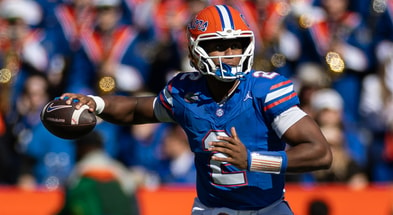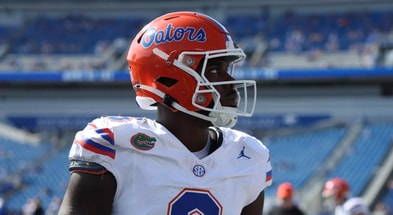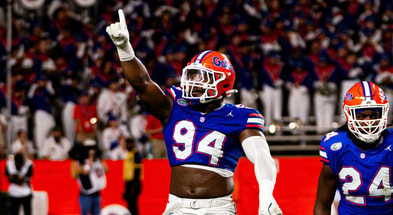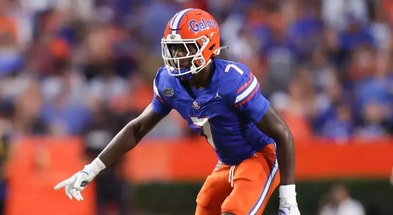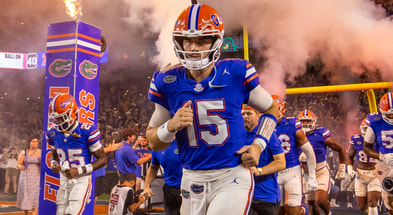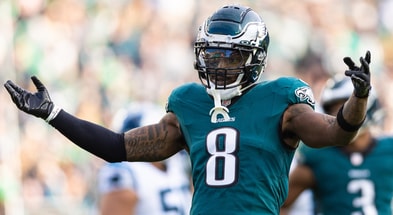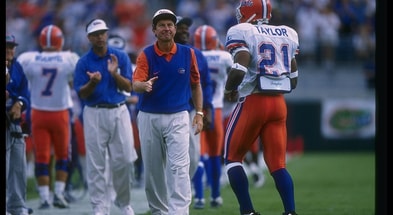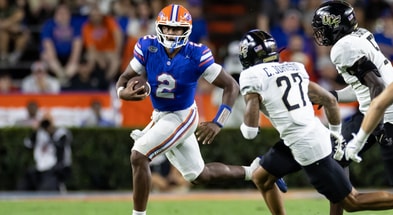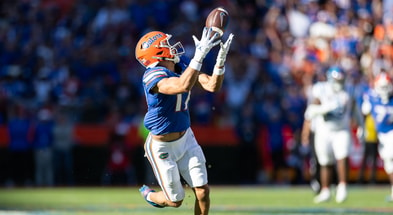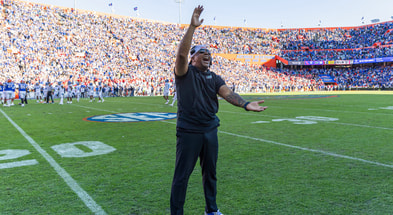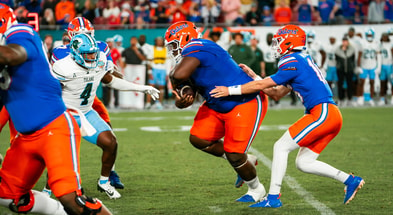Everything Billy Napier said on Monday of McNeese game week

GAINESVILLE, Fla. — Florida coach Billy Napier spoke to reporters Monday, the first day of McNeese week. The Gators lost to Utah, 24-11, in their season opener.
Below is everything Napier said to begin the second game week of the 2023 season.
Opening statement:
Napier: “A little bit about the game. I think obviously very disappointed with the performance of our team. I think the lesson here is that execution wins. I think having the discipline to execute in the moment is something that this game requires. There’s no question that we can help our players by coaching better, and certainly we can play better at times.
I think the key to the drill here is that we don’t waste this experience. I think, just having met with the leadership group, I think we’re in great position to do that. We can’t waste a minute blaming or complaining or sulking, thinking about the past. We have to learn. We have to change. We have to adapt. We have to grow.
We’re getting to a point in the season here where we’re going to be Sunday to Saturday a couple weeks in a row. You have to get consumed with your process, right? All parts of the organization, What can I do that can affect the outcome and get really good at my job? Essentially just do your job, right? Take responsibility, take ownership. Certainly that starts with me.
I think success is a dirty process, right? I think you’ve got to navigate a world that has doubt, that has fear. There’s always disruptions, there’s always challenges. It challenges everything inside of you. If you’re a competitor, this game will challenge you. I think it demands all that you’ve got.
For many it’s not worth it. But for the select few out there, they wouldn’t have it any other way. We certainly embrace the things that come with this challenge. I don’t know if you’ve watched the Netflix quarterback documentary, but Kirk Cousins said, and I think when you get in a leadership position, oftentimes I think this way, he said, I think God has given me a gift to do it, and I want to steward it as well as I possibly can. I certainly feel that way about this opportunity.
Adversity uncovers who you are, right? Leadership causes you to look in the mirror. I’m confident in this staff, this group of players, and we’re excited about being back at home this week.
McNeese comes to town. If you know football, you know the history and tradition of McNeese. This is a place that has winning expectations. Obviously this week for us is about improvement. We have to compete each day like we’re playing the best competition we will play this year. I think that was the message from the leadership group earlier today.
We look forward to getting this taste out of our mouth, and this weekend presents that opportunity.”
Is there a level of concern at all about having to hone in on fundamentals and execution while also studying the opponent?
Napier: “I think the big issue for me is the self-inflicted wounds. Gators beat the Gators in a lot of ways. Not that Utah wasn’t deserving to win. We like to say we like to control the things that we can control, and we didn’t necessarily do that. Red zone miscues, protection issues. We had a few plays on special teams that were significant in the game.
So I do think there were some positives that came out of the game. I do think we took a step forward on defense. I do think that we’re close in a lot of ways. We got some really good play from some individual players on special teams and offense.
But there’s work to be done, for sure.”
Do you feel like as a coaching staff that you had the team prepared to play? The procedural issues seemed like maybe first-game jitters.
Napier: “I do. I was surprised by that, to be quite honest. We had played pretty clean football, scrimmages, practice setting. We’d done quite a bit of significant crowd noise work. So those were surprising. I really felt confident our team was ready to play.
But you watch a weekend of college football, you see a lot of success, but you also see a lot of struggles. So the key to the drill here is how we respond and how we adapt, right? That’s not just coaches, that’s individual players.
I think this group is ready to do that.”
What can be done to improve special teams and the communication on the sidelines?
Napier: “I mean, I think that we had a really, really unique situation in the game that required us to have three personnel groups ready to go. Also we’ve got third down grouping in defense on the field. We have a rush team because we’re in the tweener area between kicker, field goal team out, or their punter runs on the field, right? That was one that I think we’ll be working on the future that caused some issues.
Look, we had some miscues in the game. There’s no doubt we missed a field goal. We shank a punt. We had the penalty from a personnel standpoint. But I do think we did some good things in the game, as well. The things that have nothing to do with the opponent are the things that we need to correct.”
The clock change rule, what was your experience? How do you think it had an impact?
Napier: “I mean, I think our volume of plays was on schedule. I think we had an SEC crew, I think they do a great job of putting the ball in play. I don’t know that the play counts were affected.
I think we’re, like, time of possession, way up there on the charts, right? I don’t know that it affected us this game. There may be games in the future where that’s the case.
I think it’s about a half of a possession per game when you look at the analytics, right? I think the national average is like 10.6, 10.7. Now it’s like 10.2, 10.3. It’s definitely affecting the game. About half a possession a game difference.”
The sloppiness of communication on special teams, does that make you rethink not having one coach dedicated to that?
Napier: “It was a very specific error. It has nothing to do with what we do year-round. It was a very specific mistake within the game. It has nothing to do with infrastructure or job description or assignments. It’s just one very specific mistake, one that we will learn from going forward, much like we do every week we make mistakes. We adjust and adapt.
So, I think it uncovered something that’s a challenging situation, one that we’ll work on in the future.”
The number of touches for your two running backs seems pretty low. Is that acceptable moving forward?
Napier: “I think it’s a great question. I think ultimately, for me, looking back at it, that’s something we could have been a little bit more committed to. There’s no doubt about it.
But we get into all of a sudden it’s 17-3, 24-3, that affects the approach you take. But I do think Utah has something to do with that, as well. I think we were 3.1 in carry on called runs. When we do run it, we got it in that four, five, six range. They got us on the ground, right? They tackled much better. Ultimately they contributed to that, as well.
But it’s a really good point.”
Identity-wise, do you still see yourself as a run-first, power-run team? Is that what you want to do?
Napier: “I think our history’s pretty well-documented. We’ve been able to rush the ball effectively in the past. We didn’t do that Saturday. I think that ultimately balance is required in this game, in my opinion, if you want to have a good team. I think there’s some weeks where you got to rush it effectively, there’s some weeks where you got to pass it effectively. Situations call for both in this game.
I think if you’re going to be really good, there’s times where you got to rush the ball, right? There’s a short yardage red zone goal line four-minute situation. Then you’re going to have to pass it. Third and long, two-minute situations.
You got to build your team where you’ve got balance and you’re capable of both. But I think just from a demeanor standpoint, I think we definitely want to be more committed to the run game.”
How are you processing the losing?
Napier: “I’m committed to not getting used to it I guess is what I would say. I’m not joking when I say that.
Top 10
- 1New
CFB Hall of Fame
2025 class announced
- 2Hot
Lou Holtz
ND legend jabs Ryan Day
- 3
CFP beer prices
Concession prices for title game
- 4Trending
Carson Beck
UGA myth dead, Bama pursued
- 5
Quinn Ewers
Texas QB declares for NFL
Get the On3 Top 10 to your inbox every morning
By clicking "Subscribe to Newsletter", I agree to On3's Privacy Notice, Terms, and use of my personal information described therein.
I asked the team yesterday, I said, What motivates you? I think for me, seeing the players get the reward from the work is motivating, but it’s also just as motivating to watch them have to go through the difficulty of losing, right, knowing what I’ve observed for a very long time, if that makes sense.
Sometimes as a leader, it’s not about me, it’s more about the rest of them. Players in particular.
The last three times you guys have played publicly, including the spring game, the offense just doesn’t seem to have a lot of punch to it? Is there a common thread?
Napier: “I mean, I don’t necessarily view them as they’re all separate entities. I mean, they’re different groups of people. A lot of football left to play. I think that’s probably a question to ask at the end of the year.”
This was maybe the worst running game you’ve ever had. Is it more the offensive line, what they didn’t do, or was Utah just that good on the defensive line?
Napier: “I think we were behind the sticks quite a bit in the game. I think negative plays are the enemy, right? When it’s second and long, third and long, it’s tough sledding. I think we got to play better on first and second down, on schedule.
We moved the ball up and down the field at times in the game. We had red zone issues in the game, whether it was penalties or negative plays, sacks.
Ultimately I think we can do better is what I would say. I think it’s a great point. There’s no question we didn’t rush the ball as effectively as we’d like. 3.1 in carry on called runs is not good enough based on our metrics. The sacks contribute to the statistics in college football. We’re still behind. We add the sacks to the rushing yards.”
Were there communication issues on your offensive line during the game?
Napier: “I think everybody likes to talk about the offensive line, okay, when it comes to protection and maybe inefficient runs. All position groups contribute to both, okay?
I’ve said this publicly many times. When you rush the ball effectively, it’s not just the offensive line. I mean, I think we’ve got to play well on the edges. We’ve got to have precision in footwork and eye discipline at running back. The quarterback has to make the right decision in terms of distributing the ball. The same could be said for protection.
We had other position groups that caused problems in protection in the game. It’s not always just the offensive line. I think we’re quick to point the finger at the quarterback. We’re quick to point the finger at the offensive line. I think all positions contribute.
Sometimes it’s a receiver, right? Maybe the receiver doesn’t run the route with precision, and the quarterback has to hold the ball. I think there’s a number of things that contribute to protection issues.
So the lesson here is that there’s no one single individual to blame here, other than me, okay? I think ultimately the buck stops here. We’re going to go fix it. That’s what I would tell you.”
How would you evaluate third down play-calling in this game? How did you think that went?
Napier: “I think we’re living in third and long, and that’s not where you want to live. I think national average in all these situations that we had are not good for any team, much less our team. We want to live in third and manageable. That comes down to eliminating the negative plays.
Ultimately if you take care of the ball and you limit negative plays, you’re probably going to have a pretty good day on offense. Those are two significant stats in this game. We took care of the ball outside of the turnover, which was a little bit unique in itself. Then the issue was the negative plays. Penalties being in that category, right? We’ll take those third and ones and convert those and not have a delay of game, which I can help there.
I think the negative plays on third and manageable contributed to third and longs, and now all of a sudden we’re not near as successful as we’d like to be.”
Thoughts on Eugene Wilson and will he get more touches?
Napier: “Yeah. I think we’ve observed him in the practice setting. He proved to be a really good competitor on game day. There’s no doubt he’s really unique with the ball. We got it to him, and he’s capable. I think he’ll be out there running around for the Gators in the future, for sure.”
What did you think about Miguel Mitchell in his first start?
Napier: “He was one of our players of the game. I do think that Miguel showed promise last year. We tried to play him as a true freshman last year in some different roles.
Miguel has got height, length and speed. He’s a smart player. I think he’s had a good off-season. I think he’s in position to have a good year. He was one of our players of the game.”
Princely Umanmielen’s production, what can you do to get him more involved?
Napier: “Well, I think at times late, he landed a few times. Think did a good job getting the ball out of their hand. But I think at times his position was disruptive, if that makes sense, the position that he plays. T.J. was productive in the game. Princely affected the quarterback. Maybe he didn’t land a couple times, but he did affect the quarterback at times. Princely will be just fine.”
Does the loss make you question the fundamentals of the infrastructure, special teams? Are you more engaged now? What has this done to you?
Napier: “Yeah, I mean, you just want to do the best job you can do for your people ultimately. When you struggle, you just want to do better for your folks ultimately. I think you guys can agree, right? You got the people that work really hard, they don’t get the result they want, you’re frustrated and disappointed with the performance.
Ultimately you want to do better for your team, right? I would tell you that a lot of people feel that way. It’s not just me. So, I think this group’s going to respond the right way.”


